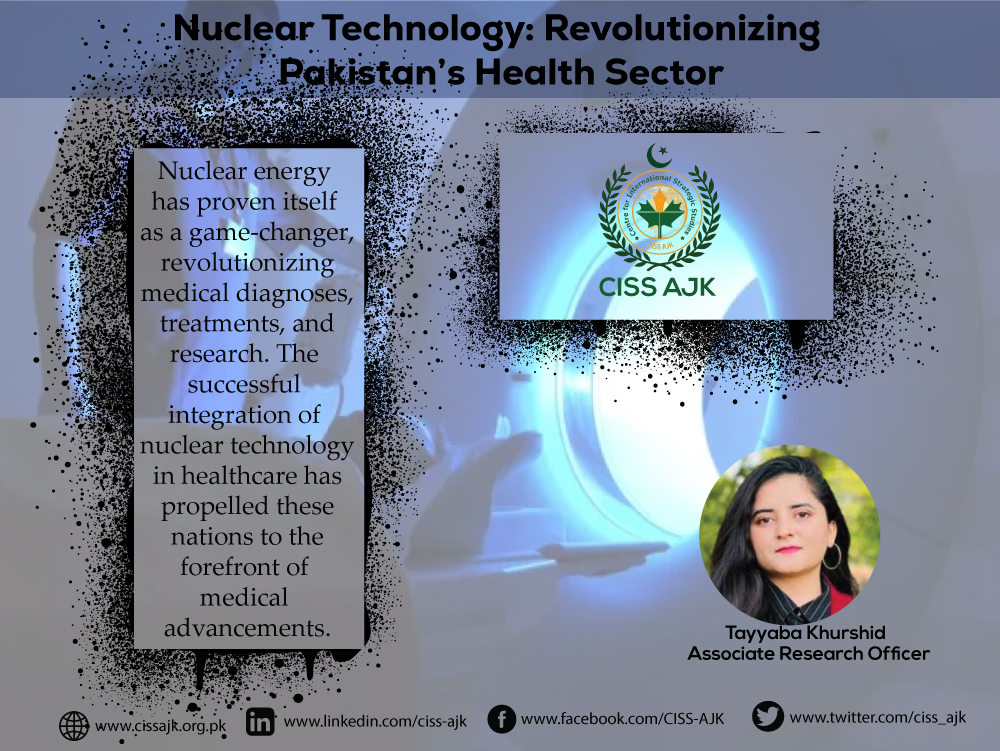757
In today’s rapidly advancing world, it is crucial for nations to explore innovative solutions to bolster their healthcare systems. One such avenue with immense potential is the utilization of nuclear technology in the field of medicine. Developed states around the globe have already embraced this groundbreaking approach, reaping numerous benefits and transforming their health sectors.

Nuclear energy has proven itself as a game-changer, revolutionizing medical diagnoses, treatments, and research. The successful integration of nuclear technology in healthcare has propelled these nations to the forefront of medical advancements, and it’s high time for Pakistan to follow suit.The application of nuclear technology in the health sector brings forth a myriad of advantages. Firstly, it enables precise and accurate diagnoses, leading to the early detection of diseases that may have otherwise gone unnoticed. Advanced imaging techniques, such as Positron Emission Tomography (PET) scans, utilize radioisotopes produced through nuclear reactions to create detailed images of internal organs and tissues. This enables physicians to detect and treat ailments at their earliest stages, significantly improving patient outcomes and saving countless lives. Nuclear energy plays a vital role in cancer treatment. Radiotherapy, a widely employed technique in the fight against cancer, utilizes ionizing radiation produced by nuclear reactors to target and destroy malignant cells. This non-invasive approach offers a powerful weapon in the battle against this devastating disease, granting hope to millions affected by cancer worldwide. By embracing nuclear technology, Pakistan can enhance its oncological capabilities, offering its citizens access to state-of-the-art treatments and reducing the burden of this affliction on society. Furthermore, nuclear research has the potential to unlock groundbreaking medical discoveries. The production of isotopes in nuclear reactors is indispensable for various medical procedures, including radiation therapy, imaging, and pharmaceutical research. Additionally, nuclear techniques like neutron activation analysis facilitate the identification of trace elements in biological samples, aiding in the diagnosis and monitoring of various diseases.
By investing in nuclear research and development, Pakistan can foster a fertile ground for medical breakthroughs, attracting brilliant minds and driving innovation within the country.Pakistan’s Impressive Milestones in the Health Sector Pakistan has demonstrated a commendable commitment to harnessing the potential of nuclear energy in its health sector, with remarkable progress achieved through dedicated institutions and collaborative initiatives. The Pakistan Institute of Engineering and Applied Sciences (PIEAS), recognized for its excellence in nuclear sciences and technology, has actively contributed to the integration of nuclear techniques in medicine. PIEAS offers specialized programs in medical physics, nuclear medicine, and radiation oncology, equipping aspiring professionals with the knowledge and skills necessary to drive innovation in the healthcare domain. In addition to PAEC and PIEAS, the Nuclear Medicine, Oncology, and Radiotherapy Institutes (NORI) in Islamabad and the Shaukat Khanum Memorial Cancer Hospital and Research Centre in Lahore have emerged as premier centers for nuclear medicine and radiation oncology. These institutions employ state-of-the-art facilities, including advanced positron emission tomography-computed tomography (PET-CT) scanners, gamma cameras, and radiation therapy equipment. Through multidisciplinary collaborations and rigorous research, they have been instrumental in advancing the field of nuclear medicine and radiotherapy in Pakistan. Furthermore, Pakistan has actively engaged in international collaborations to enhance its capabilities in utilizing nuclear technology for healthcare. The International Atomic Energy Agency (IAEA) has been a valuable partner, supporting Pakistan in areas such as nuclear medicine, radiotherapy, and radiopharmaceutical production.
Collaborative projects with IAEA have enabled knowledge exchange, capacity building, and access to cutting-edge technologies, thereby bolstering Pakistan’s expertise in nuclear medicine.It is worth noting that Pakistan’s progress in incorporating nuclear energy in the health sector extends beyond clinical applications. The country has also made significant strides in producing radiopharmaceuticals, essential for diagnostic and therapeutic purposes. The Pakistan Institute of Nuclear Science and Technology (PINSTECH) has been actively involved in the production of radiopharmaceuticals, contributing to the availability and accessibility of these crucial medical substances within the country. Through the concerted efforts of these esteemed institutions and collaborative endeavors, Pakistan has made significant headway in leveraging nuclear energy for the betterment of its health sector. The commitment to research, state-of-the-art facilities, and international partnerships has positioned Pakistan as a regional leader in nuclear medicine, radiation oncology, and related fields. With a continued focus on innovation and collaboration, Pakistan has the potential to further strengthen its healthcare system, offering advanced diagnostics, effective treatments, and improved patient care for its population. As we witness the remarkable progress made by developed states in harnessing nuclear technology for healthcare, it becomes evident that Pakistan must seize this opportunity to revolutionize its own health sector and avail the maximum output. By investing in nuclear energy and its applications in medicine, we can significantly enhance diagnostic capabilities, improve cancer treatment outcomes, and foster a research environment that propels medical advancements. There is a need to embark on this transformative journey, for a healthier and brighter future for all Pakistanis and Pakistan can achieve more in this journey towards ensuring Human security issues in Pakistan.

The Author is Researcher at the Center for International Strategic Studies, AJK, working on Comprehensive Security and Strategic Stability. She is also an M.Phil. Scholar at Quaid-e-Azam University Islamabad.



